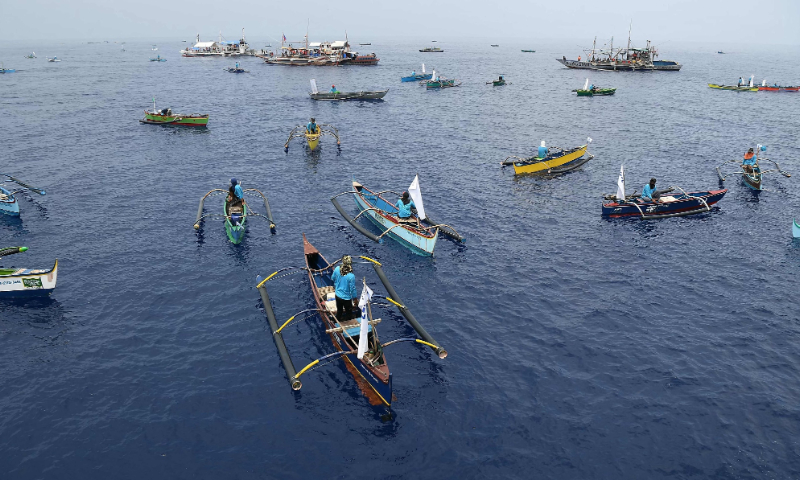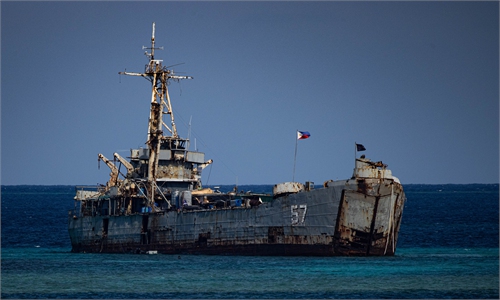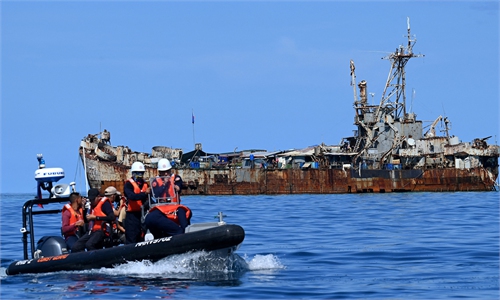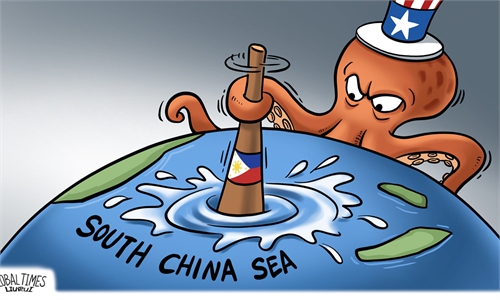China's goodwill and patience toward the Philippines are not limitless: Global Times editorial

Around 200 people on board five commercial fishing vessels on Wednesday set off from the Philippines, sailing toward the waters of Huangyan Dao under the banner of "defending rights." Photo: VCG
After the Philippines repeatedly denied the "Gentleman's Agreement" and was later refuted by China with solid evidence, Manila has started a new political performance. On Wednesday, around 200 people on board five commercial fishing vessels set off from the Philippines, sailing toward the waters of Huangyan Dao under the banner of "defending rights," with an expected arrival on Thursday. The Philippine government has dispatched coast guard ships to escort this so-called "civilian fleet," and some Western media outlets have quickly picked up the story. This well-coordinated and professional approach is something we have seen in several previous incidents where the Philippines has stirred up trouble in the South China Sea.
Before departing, the Philippine Coast Guard deliberately emphasized that they have "nothing to do with the Philippine government," while the organizers loudly proclaimed their actions to be "civilian" and "peaceful." Such strenuous preparation has just given themselves away, revealing they know well that the move to challenge Huangyan Dao is neither a civilian action nor a peaceful one. What they are truly doing is using Philippine "fishermen" as a backdrop to provoke incidents, attempting to interfere with the normal law enforcement of the China Coast Guard and the regular fishing activities of Chinese fishermen. At the same time, they aim to gain sympathy from the international community through Western media, smear China, and incite a new round of friction or even confrontation between China and the Philippines at Huangyan Dao.
Noticeably, the so-called "civilian organization" behind this activity is far from being genuinely civilian. Its spokesperson previously publicly stated that all of the organization's activities are supported by the Philippine military. Additionally, media reports have revealed that this organization is funded by relevant American institutions. Therefore, this show is actually another act in the US' Project Myoushu in the South China Sea. Through this project, the US aims to increase its interference in the South China Sea situation, smear the law-enforcement actions of the China Coast Guard, encourage relevant countries in the South China Sea region to adopt a tough stance against China, and undermine the peaceful situation that China and other regional countries have been striving to establish. Thus, although this organization deliberately downplays its political nature on its website, it is essentially a business deal between Filipino politicians and Washington.
Huangyan Dao has always been China's territory. China has indisputable sovereignty over Huangyan Dao and its adjacent waters. China, as a party with absolute advantages in all aspects, has shown enough goodwill and patience toward the Philippines. China made a goodwill arrangement in 2016 for Filipino fishermen to fish with a small number of small fishing boats in the adjacent waters of Huangyan Dao, while China continues to oversee and monitor relevant activities of the Filipino fishermen in accordance with law. China has shown its utmost patience and tolerance toward the Philippines.
On one hand, the current Philippine government has accepted China's goodwill arrangement, but on the other hand, it greedily attempts to seize more benefits. It has used the urgent desire of the US to intervene in the South China Sea situation to support itself. China has always been against bullying small countries by big powers, but it will not accept any political blackmail from any country. Regarding the Philippines' show on Huangyan Dao, China has issued a clear warning: "If the Philippines abuses China's goodwill and infringes upon China's territorial sovereignty and jurisdiction, we will defend our rights and take countermeasures in accordance with the law. Relevant responsibilities and consequences shall be borne solely by the Philippines." China has always been low-key in its actions, but it will follow through with its words. Manila should understand and take in the meaning and weight of these words.
When Global Times reporters interviewed locals in the Philippines not long ago, many fishermen expressed unwillingness to participate in the Philippines' provocative actions against China. Even some US media outlets discovered during on-site interviews in the Philippines that local farmers praised a China-funded irrigation project. The outcome of the latest performance on Huangyan Dao is not difficult to predict: It will not have any impact on China's normal exercise of sovereignty on Huangyan Dao, but will only show the international community another act of lack of credibility by Manila. Not only does China see this clearly, but regional countries and the international community also see it very clearly. The current situation in the South China Sea is generally stable, and peace and cooperation are the mainstream in the region. In response to Manila's adventurism, other ASEAN countries have in general kept their distance.
There is an ancient Chinese saying: "A gentleman's acquaintance is as light as water, and a villain's acquaintance is as sweet as alcohol." Manila should carefully consider who is applauding its show in the South China Sea, giving it one sugar cube after another, and where these things that do not belong to it will ultimately push it.



